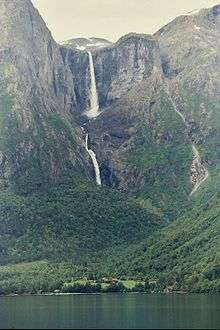Mardalsfossen
| Mardalsfossen | |
|---|---|
 View of the Mardalsfossen | |
| Location | Nesset, Møre og Romsdal, Norway |
| Coordinates | 62°28′16″N 08°07′12″E / 62.47111°N 8.12000°ECoordinates: 62°28′16″N 08°07′12″E / 62.47111°N 8.12000°E |
| Type | Tiered |
| Elevation | 945 metres (3,100 ft) |
| Total height | 705 metres (2,313 ft) |
| Number of drops | 2 |
| Longest drop | 358 metres (1,175 ft) |
| Average width | 24 metres (79 ft) |
| Watercourse | Mardøla |
Mardalsfossen is one of the ten highest waterfalls in Europe.[1] It is located in the municipality of Nesset in Møre og Romsdal county, Norway. The falls are on the Mardøla river which flows out of a hanging valley into the lake Eikesdalsvatnet, about 2 kilometres (1.2 mi) northwest of the village of Eikesdalen.[1] The waterfall is depicted in Nesset's coat-of-arms.
The total fall is 705 metres (2,313 ft) according to SSB,[2] 657 metres (2,156 ft) according to World Waterfall Database (WWD).[3] WWD reports that the SSB typically includes the head measurement for waterfalls that are situated within a hydroelectric system, resulting in a greater height estimate.[3] Mardalsfossen is a tiered waterfall consisting of two large drops and several smaller ones lower down. It is on average 24 metres (79 ft) wide. The highest vertical drop is one of the tallest in Norway. As with figures for the total height, discrepancies have been reported in the estimated height of each vertical drop. According to the SSB, the upper vertical drop is 358 metres (1,175 ft), while the WWD surveyed it as 296 metres (971 ft).[3]
The water, which has been tapped for hydroelectric use, flows over the falls during the summer tourist season of 20 June to 20 August. At other times the water is channeled through the hydroelectric scheme. The highest rate of flow ever recorded in the falls is 45 cubic metres per second (1,600 cu ft/s). Currently in the summers, the flow limited to less than 3 cubic metres per second (110 cu ft/s).[4]
In 1970 Arne Næss, the Norwegian founder of the Deep Ecology movement, tied himself with 300 others in protest against the building of a dam and the subsequent removal of the waterfall.[5]
From summer 2014 Antony Gormley’s Another Time is on view in the mist from the waterfall. Due to the immense success of the project, the exhibition[6] has been extended to 20 August 2015. The show is curated by Be Andr and is sponsored by Nesset Municipality, Nesset Sparebank, Nesset Kraft AS, Kverneland Bil and Galleri Opdahl. Accompanying the installation is a limited edition book which includes a foreword by Marit Wadsten focussing on the Mardøla campaign of 1970 and the development of resources in Eikesdal; an essay by Eckhard Schneider, director of the Pinchuk Art Center, Kiev, which explores the artist’s practice; and finally a conversation between Antony Gormley and the project's curator Be Andr.[7]
Name
The first element is the genitive of the name of the valley Mardalen and the last element is the finite form of foss which means "waterfall". The name of the valley is a compound of an old river name Mara (now Mardøla) and the finite form of dal which means "dale" or "valley". The old name of the river is probably derived from the verb mara which means "rub", "grave", or "dig".
References
- 1 2 Scheffel, Richard L.; Wernet, Susan J., eds. (1980). Natural Wonders of the World. United States of America: Reader's Digest Association, Inc. p. 230. ISBN 0-89577-087-3.
- ↑ http://www.ssb.no/a/english/aarbok/kart/i.html
- 1 2 3 "Mardalsfossen". World Waterfall Database.
- ↑ "Mardøla". {{{2}}} (in Norwegian). Foreningen Store norske leksikon.
- ↑ "Philosophers don’t have to climb mountains...".
- ↑ "Antony Gormley website".
- ↑ "Mardalsfossen Art Projects Official Website".